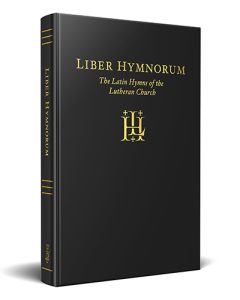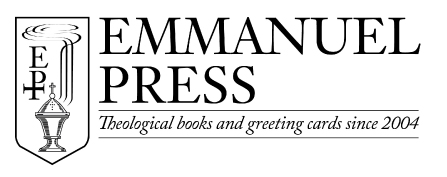THE LATEST NEWS
Liber Hymnorum: Why are these hymns important?
 Matthew Carver: “The hymns in Liber Hymnorum are important, first, because they are the Church’s hymns. They have been used by God’s people for centuries, have stood the test of time, and have been carefully tended and passed on for the use of every generation. In them we find our own prayers, praises, and thanks to the Triune God joined with those of the saints of every age. This collection, in particular, is also important because it features the peculiar forms of the melodies as they ‘grew up’ and took on their own ‘accent’ in the bosom of the medieval church of Germany. A lot of people familiar with ancient hymns are nevertheless unaware of the rich multiplicity of ancient hymn tunes from the times before later scholars normalized, and yet sadly erased, many of these beautiful peculiarities. Thus we are at the same time given a window into the musical culture of the early Lutheran period in Germany.”
Matthew Carver: “The hymns in Liber Hymnorum are important, first, because they are the Church’s hymns. They have been used by God’s people for centuries, have stood the test of time, and have been carefully tended and passed on for the use of every generation. In them we find our own prayers, praises, and thanks to the Triune God joined with those of the saints of every age. This collection, in particular, is also important because it features the peculiar forms of the melodies as they ‘grew up’ and took on their own ‘accent’ in the bosom of the medieval church of Germany. A lot of people familiar with ancient hymns are nevertheless unaware of the rich multiplicity of ancient hymn tunes from the times before later scholars normalized, and yet sadly erased, many of these beautiful peculiarities. Thus we are at the same time given a window into the musical culture of the early Lutheran period in Germany.”
_____________
An endorsement from Dr. Robin Leaver, Visiting Professor, Yale University; Honorary Professor, Queen’s University: “Many Lutherans have forgotten – or do not know – that Latin hymns were not banished when Luther created his sturdy German hymns, but both continued side by side in the liturgical and devotional life of the early Lutheran churches. A simplistic equation has often been presented: Latin hymns are Catholic; vernacular hymns are Lutheran. But the sensitivity towards some Latin hymns was not linguistic but theological. Since the Reformation was nurtured and promoted by Latin schools, Latin hymns – corrected if necessary, as well as newly written – continued to be sung by the Latin scholars. This singing was often in alternation, with scholars singing each stanza in Latin and the parishioners following with the same stanza in German. This valuable collection, which is based on early Lutheran sources, on the one hand, witnesses to the historic Lutheran tradition of Latin hymnody, and on the other, is a practical collection of Latin hymns with English translations. The Latin hymns can be sung in seminaries and conferences where Latin is known and the vernacular versions sung from time to time in parishes. And there is also the possibility of experiencing the early Lutheran tradition of singing the alternate stanzas of a hymn in Latin and the vernacular. We are indebted to Matthew Carver for drawing our attention to this neglected liturgical tradition and for making these texts, translations, and music accessible.”
How can Liber Hymnorum be used in a classical education or homeschool setting?
 *Pre-order the next printing and save 10%*
*Pre-order the next printing and save 10%*
“It is particularly with classical Latin teachers and homeschoolers in mind that the Latin (with normalized spelling) has been included, though it will also be of interest to scholars as well. The Church’s Latin, especially as found in its best hymnody in addition to the Latin psalter, is an important part of a well-rounded Latin course, since it gives students a sound example of a medieval Latin embraced by every age of the Latin-speaking church and filled with Christian content. The effort to sing a few stanzas every day will reward any student with improved familiarity with Latin poetry, and the melodies will serve as a mnemonic device, making the texts easier to learn by heart. Older students can also find in the Latin hymns models for their own composition practice. The Gregorian notation, too, with its modes and clefs, is an important part of music history. Nevertheless, the modern notation provided in the English section can be used to play and teach the Latin hymns.”
-Matthew Carver: Author, editor, and translator
____________
“Liber Hymnorum will be a powerful resource in our house. As a liturgical Lutheran, I am thankful to have another devotional tool, especially one with simple, beautiful melodies and meaningful text. I am humbled and pleased that this hymnal can emphasize our continuity of faith over generations and centuries!…This will be a great resource for liturgical Lutherans, families, catechizers, homeschoolers, Latin students, and anyone interested in history, theology, Lutheranism, or the Reformation.”
-An excerpt from the forthcoming review by Deaconess Mary J. Moerbe, homeschooling mother of six, Lutheran author and speaker, who encourages Lutheran writing at maryjmoerbe.com
New Look: Ceremony and Celebration
 While the content remains the same, Ceremony and Celebration has a new cover of red faux leather embossed with a gold leaf in lay. We’re very pleased with the quality of the materials and printing, and we know that our customers will love the smooth finish and stunning colors.
While the content remains the same, Ceremony and Celebration has a new cover of red faux leather embossed with a gold leaf in lay. We’re very pleased with the quality of the materials and printing, and we know that our customers will love the smooth finish and stunning colors.
“Our attitude toward human rites and ceremonies is evangelical, not legalistic. Rubrics and directions do not proceed from the Law but from the Gospel. We do not want conformity on the basis of legal compunction, but on the basis of our new life in Jesus Christ by which we are made free from the curse of the Law and are enabled by the Holy Spirit to live more and more in Christian love and liberty.” (p. 22)
General Rules of Ceremony: The Fourth Principle
And now for the last principle of the general rules of ceremony, as outlined by Paul H.D. Lang in Ceremony and Celebration. In this book, Lang discusses how the confessional Lutheran position on ceremony is based on both tradition and the Holy Scriptures.
“The fourth principle is humility. We are exhorted, not only to be humble before God: ‘Humble yourselves under the mighty hand of God’ (1 Peter 5:6), but also to be humble in our relationship with our fellow Christians: ‘Be kindly affectioned one to another with brotherly love; in honor preferring one another’ (Rom. 12:10). The rule governing the ceremony of kneeling for the confession of sins, for example, is based on this law. So also are the rules pertaining to the ceremonies of showing respect to one another, of honoring a person’s position and office, and of the place of rank in a seating arrangement and procession.” (p. 62)
General Rules of Ceremony: The Third Principle
In the two previous posts, we described the first and second principles of the general rules of ceremony as outlined by Paul Lang in Ceremony and Celebration. In this book, Lang discusses how the confessional Lutheran position on ceremony is based on both tradition and the Holy Scriptures.
 Now, the third: “The law of order is another basis for rules of ceremony. This law is expressed in the Word of God, ‘Let everything be done decently and in order’ (1 Cor. 14:40). God is a God of order. He is against disorder, confusion, slovenliness, crudeness, and ugliness. If that is true in every area of our lives, it is particularly true when God is present with us in a special way in the church’s worship. The Old Testament worship which God prescribed was, in every detail of the tabernacle and temple, the sacred vessels and vestments, the rites and ceremonies of the services, orderly and beautiful. We have no such detailed prescriptions in the New Testament, but the principle remains. The rules governing the traditional ceremonies are based on the law of order.” (p. 62)
Now, the third: “The law of order is another basis for rules of ceremony. This law is expressed in the Word of God, ‘Let everything be done decently and in order’ (1 Cor. 14:40). God is a God of order. He is against disorder, confusion, slovenliness, crudeness, and ugliness. If that is true in every area of our lives, it is particularly true when God is present with us in a special way in the church’s worship. The Old Testament worship which God prescribed was, in every detail of the tabernacle and temple, the sacred vessels and vestments, the rites and ceremonies of the services, orderly and beautiful. We have no such detailed prescriptions in the New Testament, but the principle remains. The rules governing the traditional ceremonies are based on the law of order.” (p. 62)

Let’s stay in touch! To receive the most current information on our products and new releases, join our email list today!

